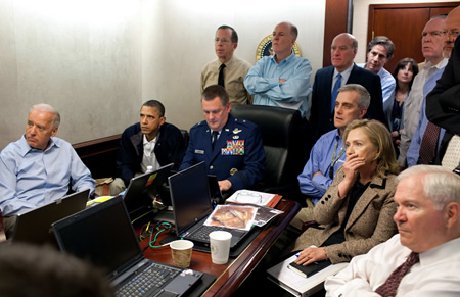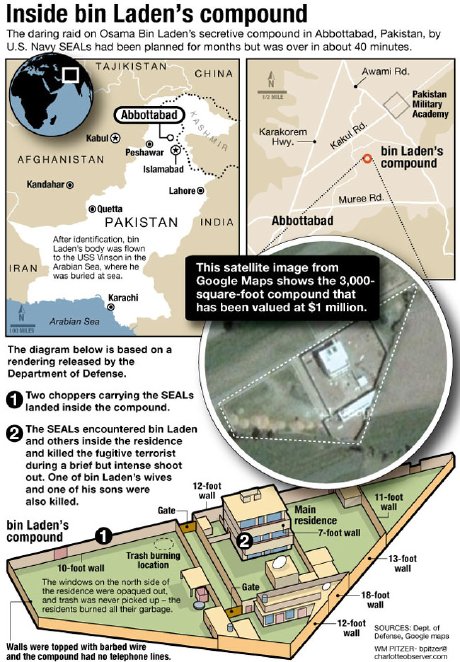Adil Najam
What do Pakistanis think about how Osama Bin Laden met his end, the implications of that end?
There are as many opinions on what happened in Abbottabad as there are Pakistanis. Maybe more. But there is no sense whatsoever where the government of Pakistan (or any of its major institutions) stand on what happened – or stood when it was happening. For 36 hours now the world has been waiting to see what Pakistan does and says – the silence and incoherence from Islamabad has not just been embarrassing, it has been damning. Finally, key institutions in Pakistan have begun trying to piece a narrative together – unfortunately it is way too late and the narrative itself rather lame.
When I put up a short post on Osama Bin Laden’s death soon after the news broke, I had hoped that in time more details would become available and we would get more clarity on what happened and how. We do now have more detail. But certainly not more clarity. The story about what happened in Abbottabad now lives in Spin-abad. Everyone – from governments, secret agencies, the media, the Twitterati, and your spinster aunt – are taking a spin. Many are taking multiple, sometimes contradictory, spins. Everyone except the Pakistan government.
That, of course, is a surprise – not only because the Pakistan government does have a lot of explaining to do, but even more because it is in the interest of the Pakistan government to do that explaining itself rather than have someone else do it for them. Yet, up until it was already too late, Pakistan seems to have abdicated that responsibility. In fact, President Barack Obama, Secretary Hillary Clinton and Senator John Kerry seemed to be making that (half-hearted) case for Pakistan more than anyone in authority in Pakistan. Given that President Obama had informed President Zardari before the speech from the US President, one would have assumed that the Pakistan President and his media handlers would have their own statement ready to go on the air minutes, if not seconds, after President Obama’s speech. This is not about spin and PR, this is Diplomacy 101: Own and define the narrative as soon and as clearly as you can before someone else defines it for you – especially if the narrative is likely to be unfavorable.
But the narrative, itself, is not the core of Pakistan’s challenges. The problem is the facts on the ground and the government’s inability and unwillingness to explain them. Pakistan is used to the feeling of the world ganging up on it. But there are good reasons for the questions being asked of Pakistan by the world today. There are even better reasons for the questions being asked of Pakistan by Pakistanis today. Whether the government comes clean to the world or not, it is vital that it respond to Pakistanis. The first is a matter of national image (no trivial issue, that), but the latter is a question of citizen trust in national institutions (an existential element of statehood).
The fact is that there is a Pakistan case to be made on this issue. And it needs to be made to Pakistanis much more than to the rest of the world. It is a case that forcefully stresses that a world, and a Pakistan, without Osama Bin Laden in it is a vastly better world than one with him in it – this is a villain who orchestrated events that have left more than 30,000 Pakistanis dead in extremism and terrorism. It is a case that legitimately highlights the sacrifices that Pakistan and Pakistanis have, in fact, made in the fight against terrorism. Most importantly, it is a case that honestly analyzes what happened in Abbottabad – it is not a surprise that Osama Bin Laden was found in Pakistan and in a large urban area (just like nearly every other major Al Qaida figure captured) – but an explanation is owed on why Pakistani intelligence failed to make the connections that led to him, an explanation is owed on exactly what Pakistan’s official role in the final operation was (or was not), and an explanation is owed on exactly what Pakistan’s strategy on countering terrorism is, who is running it, and why it is not working well enough or fast enough.
In a country and an ‘establishment’ as divided as Pakistan, this cannot be an easy conversation; it is not supposed to be. It is time to ask honest and tough questions of everyone. It has long need a necessary conversation; now is the time to have it.






















































Excellent commentary.
I think the reason for the silence is that the government and military has been afraid to the right wing and what they would do and say if they found that actually Pakistan authorities were central part of this.
@auk
The decision to not release photos has exposed the hoax of the US government and their lapdogs. And since when the Americans started respecting Muslim burial laws? What about Saddam’s body and those of his sons who were not buried for days. And those hundreds of people with alleged Taliban links who were left to die in containers and remained unburied for days. America has blood of millions on its hand and if one believes in the purity of blood; it will not go astray. It will haunt the US till the last day of its existence.
Obama’s decision not to release OBLs photos is a tight slap on the face of conspiracy theorists. The american president does not care about proving anything to anyone, neither does he care about the rabid right wing of America calling for the release of those gory photos.
Well, here is one Pakistani who ‘Live Tweeted’ the American raid to capture Bin Laden. One of the neighbors. Read carefully and ready to adjust some stereotypes.
Join the Q &A via Huffington Post!
Some excerpts.
http://www.huffingtonpost.com/2011/05/04/sohaib-at har-reallyvirtual_n_857385.html
—————————————-
Drewmaust asks in the Huff Post comments
Sohaib, on the map it looks like there is a church just a block or so away from the compound. Evere been? What can you tell us about it? Are there Christians in Abbottabad?
There are many christians in Abbottabad – and yes, there are more than one churches as well. The town was built by the British so there are also a lot of mission schools besides the churches. The christian community lives peacefully with the muslims (just in case you were wondering).
——————————
@ezekial asks via Twitter
What people in Abbottabad thought about #OBL’s mansion in the last 5 years? didn’t it look creepy?
First of all, it was not a mansion – it was an unfinished house, despite covering a large area, the construction was quite normal and did not really stand out much. WHen I talked to the locals, they attributed the tall walls to the religious nature of the residents (the ones that were visible publicly)
——————————————-
DoesNotComputer asks in the Huff Post comments:
What was the reaction of your neighbors when they finally understood the news? In addition to the surprise, were they feel a positive attitude toward the fact that he was gone? What was the general consensus? Also, just want to send my love to you from the USA :)
The neighbors were mostly happy when I saw their faces, perhaps, because many of the evacuated people (from the Swat operations) chose to settle in Abbottabad. This city has all types of people, so I can’t really tell you anything about the general consensus besides the attitude of the 50-60 people that I have interacted with in the last 2 days. And thanks :-)
—————————-
i think that the possibility that they amy have taken obl alive (though disabled and unconscious) has been dismissed out of hand.